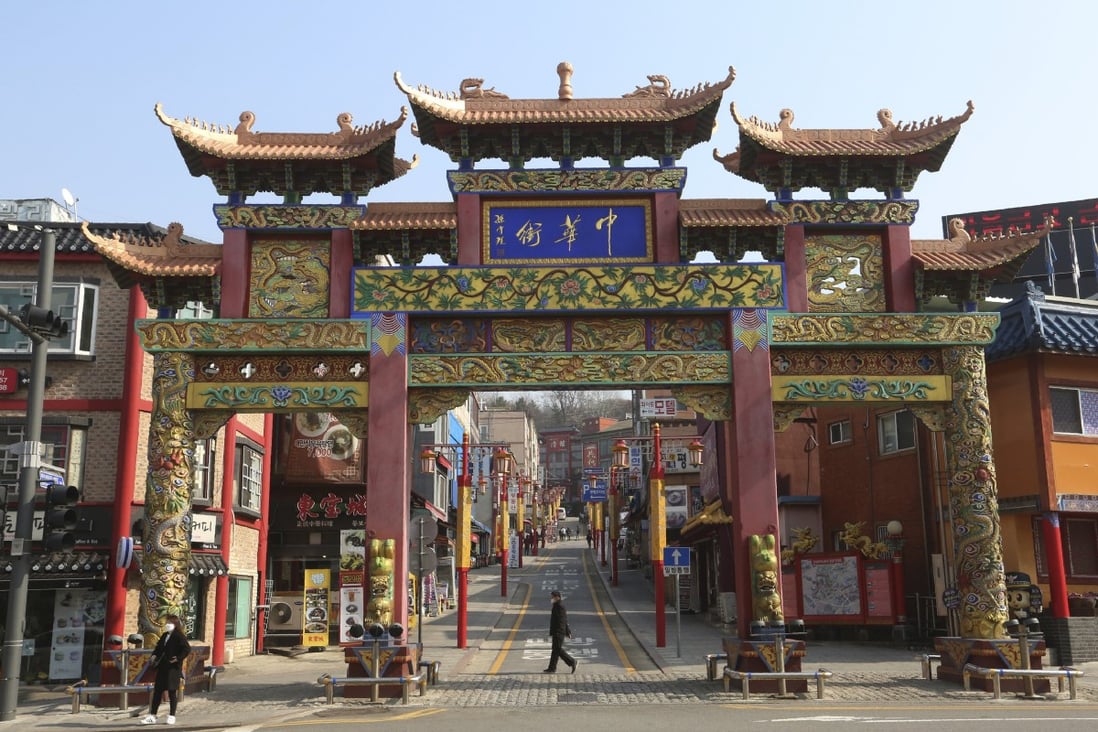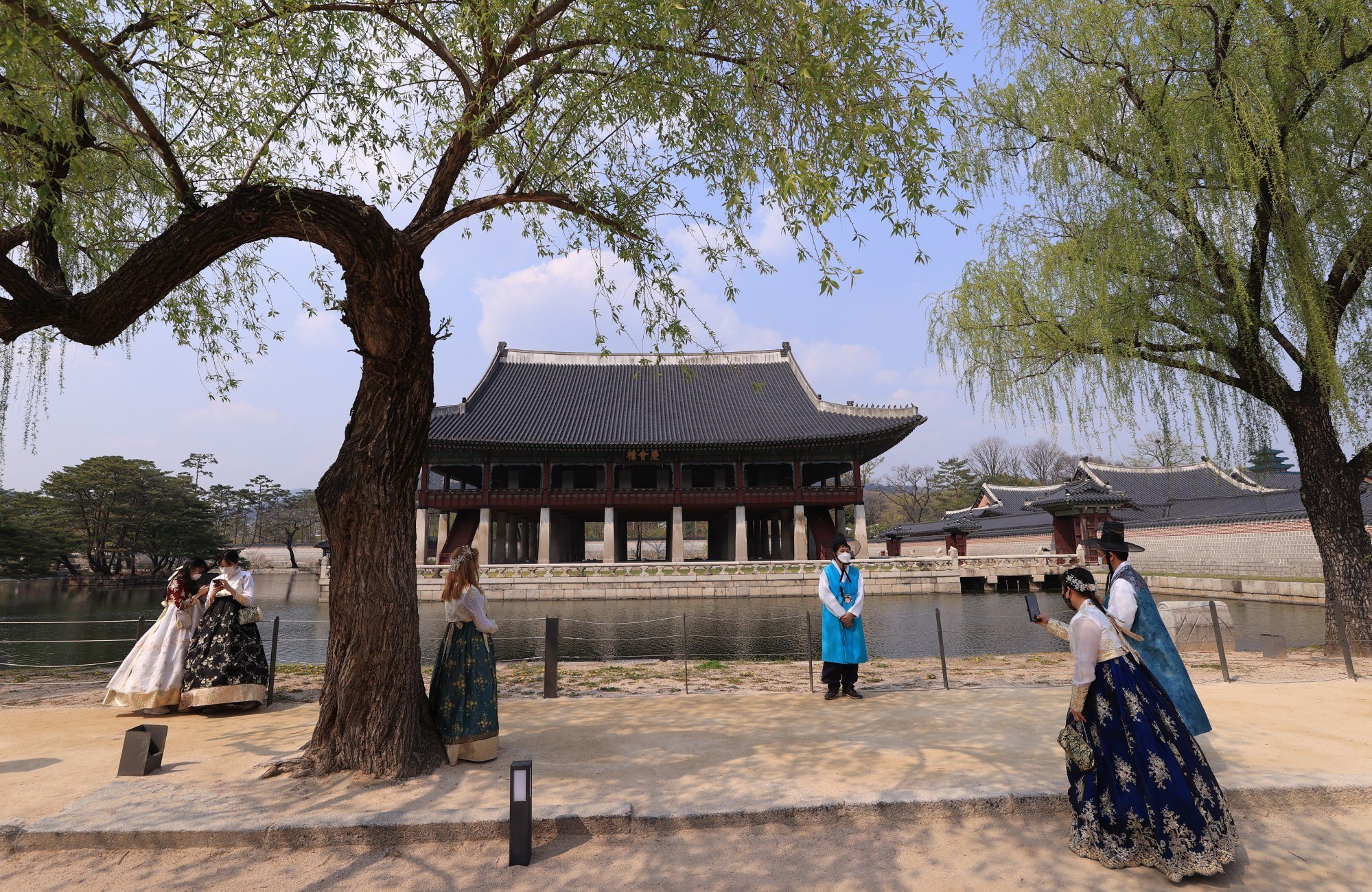- Over
650,000 people signed an online petition against the project in Gangwon
Province, despite officials repeatedly stating it was a cultural park,
not a Chinatown
- South
Korean public sentiment against China has been growing in recent years,
with an analyst warning this could damage diplomatic efforts to improve
ties
 Had
it gone ahead, the Korea-China Culture Town would have been built on a
site 10 times larger than the country’s most famous Chinatown in Incheon
(pictured). Photo: AP
Had
it gone ahead, the Korea-China Culture Town would have been built on a
site 10 times larger than the country’s most famous Chinatown in Incheon
(pictured). Photo: APThe decision came after what Gangwon Province head Choi Moon-soon said was a series of “fake news” allegations that taxpayers’ money would have been used to build a settlement town for Chinese immigrants – despite repeated clarifications that it was intended as a cultural park. “It is not a Chinatown,” the province had stated.
Kolon Global Corporation said on Monday it had cancelled the Korea-China Cultural Town project in the face of a fierce public ire sparked by the petition on the presidential Blue House website’s online petition page.
“The company acknowledges that the Korea-China Cultural Town cannot move forward any longer” despite “huge losses” the withdrawal would incur, it said in a notification to Gangwon Province.
Kolon Global said the project was not aimed at building a Chinatown as was claimed by the petitioner and some news reports, but a culture-themed district where tourists would be able to enjoy traditional and modern culture from both China and South Korea.
“Regardless of the truth and facts, we have no alternatives but pay heed to the voices of the 650,000 people who have signed the petition, because [South Korean] people are also clients who are no less important than foreign tourists,” it said.
Had it gone ahead, the Korea-China Culture Town would have been built by 2022 on a site 10 times larger than the country’s most famous Chinatown in Incheon city, west of Seoul.
It would have provided a range of facilities and attractions, including Korean style buildings, traditional Chinese gardens, a K-pop museum and a Korean Wave video display, “enabling mutual cultural exchanges between the two countries”, the province said.
But the clarifications failed to quell the rumours and soothe public anger, which was further stoked by further false reports that the province planned to bulldoze a prehistoric site to build hotels catering to Chinese tourists.
“Why should we create a little China on the soil of the Republic of Korea [South Korea],” read the online petition titled “Scrap the Chinatown Construction in Gangwon”.
“People don’t understand why we should provide chances for experiencing Chinese culture on our own land. Don’t yield any piece of our land to China,” said the petition which garnered a whopping 660,000 signatures since it was published on the Blue House website on March 29.

The hostility to what Gangwon was promoting as a cultural exchange venue reflected popular perceptions that China is engaged in “cultural imperialism against Korea”, said the Korea Joongang Daily.
The petitioner said Koreans were worrying they might lose their cultural identity to China’s attempts to “plunder” Korean traditional cultural heritage and distort history to include ancient Korean kingdoms that existed in Manchuria as part of China.
“It is time to confront China”, which keeps trying to steal our culture”, said the petitioner.
This could spark angry reactions from Chinese people, especially young online warriors, damaging diplomatic efforts to improve ties
A different online petition posted on March 24 on the Blue House website condemned a new SBS TV history-themed fantasy series Chosun Exorcists as distorting historical facts and using props of Chinese origin such as mooncakes and specific home decorations.
It has secured some 250,000 signatures over the past month, forcing SBS to pull the plug on the series after airing only two episodes, incurring millions of dollars in losses.
“It is quite regrettable that public opinions have been trending in the wrong direction against truths and facts, forcing Kolon Global to abandon the project,” a Gangwon Province official told This Week in Asia.
“Some Chinese people may see this incident as an epitome of anti-China sentiments in this country,” said Yoon Sung-suk, a political-science professor at Chonnam National University.
“This could spark angry reactions from Chinese people, especially young online warriors, damaging diplomatic efforts to improve ties.”
Public sentiment against an increasingly assertive China has been growing in the country in recent years, especially after China’s economic retaliation against South Korea over its 2016 deployment of the highly sophisticated US missile defence system known as Terminal High-Altitude Area Defense (THAAD).
Controversies over Korean food and clothing, and China’s purported attempts to distort history and “hijack” cultural heritage further stoked public anger, especially amid the Covid-19 pandemic, compelling many young South Koreans and Chinese to denounce the other country online.
“Korea is becoming like a colony by the Chinese Communist Party … Politics, economy and culture are all commandeered by China,” tweeted one user.
But others voiced different opinions. “Chinatown in Gangwon Province turned out to be a fake news! Someone attempted to frame it up (as a community settlement for Chinese immigrants),” tweeted Kim Mi-kyoung.







0 comments:
Post a Comment